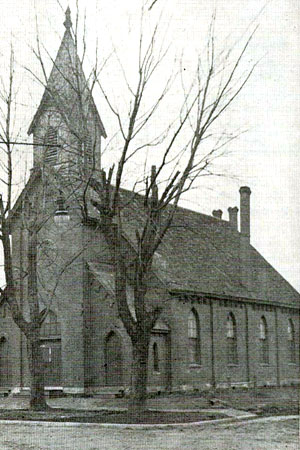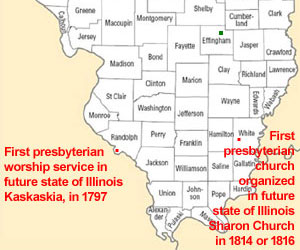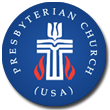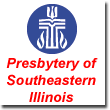Worship on Sunday Mornings & Holy Days (Childcare Available)
An Open Communion Table
Welcoming All People
A Blend of Contemporary and Traditional Worship Styles
History

If you think of the whole of Christianity as a tree with many branches, presbyterians are a part of the branch called Reformed churches. These churches began in the Sixteenth Century during the Protestant Reformation. They looked to the teachings of John Calvin and a few other reformers as being reliable ways of understanding and interpreting the Bible. Reformed churches were so-called because they wanted to "reform" the Church on the basis of the Word of God found in Scripture.
Presbyterians in the United States
Presbyterians were among the earliest Reformed immigrants to America. They settled up and down the East Coast, and began to push westward into the American wilderness, founding congregations as early as the 1630s. In 1706, seven Presbyterian ministers formed the first Presbyterian presbytery in the New World. The clergy assumed the freedom to organize and the right to worship, preach, teach, and administer the sacraments. Growing population and immigration prompted the presbytery to organize a synod in 1717, with four constituent presbyteries.
History of the Church | Presbyterian Historical Society
Significant Dates in Presbyterian History
| 1630s | First Presbyterian churches organize in the colonies. |
| 1683 | Francis Makemie, the "Father of American Presbyterianism," arrives from Ireland. |
| 1706 | First presbytery in the American colonies organizes in Philadelphia. |
| 1717 | First synod organized with four presbyteries. |
| 1789 | First Presbyterian General Assembly meets in Philadelphia. |
| 1807 | First African-American Presbyterian church organizes in Philadelphia. |
| 1837 | Elijah Lovejoy, minister and abolitionist publisher, dies while defending his printing press against a pro-slavery mob in Alton, Illinois. |
| 1861 | The General Assembly pledges loyalty to the Federal government. Southern commissioners withdraw and form the Presbyterian Church in the Confederate States of America. |
| 1930 | The PCUSA's constitution is amended to allow women to be ordained elders. |
| 1956 | First woman minister ordained, Margaret Towner. |
| 1964 | First African-American moderator of a General Assembly, Edler Hawkins. |
| 1972 | First female moderator of a General Assembly, Lois Stair. |
| 1983 | Two largest American presbyterian denominations, reunite after 122 years. |
| 1986 | First Native-American woman ordained, Holly Haile Smith. |
| 2014 | PCUSA embraces LGBT-inclusive definition of marriage. |
Presbyterians in Illinois

Rev. John E. Finley, a Presbyterian minister from Chester County, Penn., to Mason County, Ky., coveted the privilege of being the first to plant the Church of Christ upon the territory of the future great State of Illinois; and also in the Louisiana Territory, in what is now the state of Missouri. In 1797, Mr. Finley descended the Ohio River in a keel-boat, with several of his neighbors, members of the Presbyterian Church, and ascended the Mississippi, and landed at Kaskaskia, with the bold design of planting the standard of the Cross in the Spanish Colonies west of the Mississippi River. Mr. Finley probably had ultimate reference to a mission among the Indians. He preached the Gospel, catechised and baptised several of the "red men." But, in short time, he was led to abandon the enterprise. . . . During the years 1810, 1811, and also in 1814 and 1816, Rev. James McGrady spent a considerable time in the southern counties of Indian[a] and in Illinois, and in 1816, or some accounts say, in 1814, Mr. McGrady organized Sharon Church in White County. This was the first Presbyterian Church in Illinois, and its honored name still stands on the rolls of the Presbytery of Cairo.
The History of Menard and Mason Counties, Illinois. Page 234.
Chicago, O.L. Baskin & Co, 1879. Web.
Presbyterians in Effingham
Nineteen years before the community of Effingham was founded, presbyterians gathered in Effingham County. The first meetings were in the year 1834 at the home of Jonathan Parkhurst, three miles south of present day Funkhouser. Rev. John McMaster was the leading spirit. Those associated with him were Johnathan, Elisha, Jesse, and Benjamin Parkhurst; John Funkhouser; John Trapp; Nicholas Radley; John and Patsy Scott. At another time, Rev. Stephen Kell also served to lead the group. No church building was erected, but the group met sporadically in homes over several years.
In 1850, the Ewington Presbyterian church was organized by the Rev. John H. Russ with eight members. Jesse Parkhurst was the first elder. When the Illinois Central Railroad was built, the people of Ewington migrated to the new town of Effingham. During the Civil War, this group of presbyterians in Effingham realized that a church was needed.
Fourteen years later, on November 13, 1864, the presbyterians of Effingham organized a church. Rev. S. R. Bissell came here as a Home Missionary, representing the Presbyterian Board of Home Missions. He saw the need for a church and secured the assistance of the Rev. A. J. Norton. The organization meeting was held in the Court House. In addition to these two men, there were five persons present. The original membership for the church consisted of the following: Solomon Swingle, Mrs. M. C. Swingle, Mrs. Sara Preston Bissell, Isaac Bates, and Mrs. Jane Bates.
In 2014, the congregation prepared this 150th Anniversary History booklet.
Having served this community for over 150 years, the First Presbyterian Church of Effingham looks toward the future with great excitement and optimism. Though the world has changed in many ways over the life of our congregation (and not always for the better), changing times cannot, and will not shake the sure foundation of our faith in Jesus Christ, nor will they give us cause to doubt the solid work of those generations of believers who came before us.



